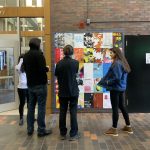Last weekend, Boston University’s Metcalf Ballroom bustled with young women hailing from around the globe, energy soaring as they created, innovated and shared their love for technology.
Organized by Boston students, SheHacks Boston was the largest all-female and femme non-binary hackathon in the world, with over 1,000 participants. Sponsors included leaders of the tech industry such as Google, IBM and Two Sigma.
“Being a woman in tech, sometimes you feel a little bit alone. You don’t feel like there are other people like you who share the same passions,” said Sreeya Sai, the head of sponsorship at SheHacks. “But seeing a lot of people in a room that are really passionate about the same things is really exciting.”
The participants had 36 hours to create a website, app or other piece of technology to solve an issue they were given, which included disaster, saving the planet, gender equality, political polarization and health and wellness.
Participants were innovative in their real-world solutions to real-world problems.
Ibtihal Aboussad, a freshman studying computer science at Harvard University, and her team addressed the often-overlooked refugee crisis occurring internationally.
“Our theme is disaster,” Aboussad said. “We’re making a website for refugees that stores their medical records and medical data so that they can have access to it all across the world.”
Paula Espitia, also a freshman studying computer science at Harvard, added, “We have a friend who knows a person who volunteered in hospitals in Syria. We heard about how all their records were lost.”
Grace Chen, a freshman studying electrical engineering at Princeton University, and her team created an app to match students with a licensed mental health professional if their school services failed to provide the help they need.
“We think it’s a very prominent issue on a lot of college campuses … A lot of students don’t have easy accessibility to psychological services,” Chen said. “So basically, what our app is supposed to do is match you up with a licensed professional or an employee in psychological services offered by the university.”
In addition to hacking, one of the goals of the event was to allow for networking with Fortune 500 companies and nonprofits that sponsored SheHacks.
“Just being able to talk to someone in person versus over the phone or email, saying ‘I’m interested in your company, talk to me about what I can do,’ and having that one-on-one interaction is a great opportunity,” said Eleanor Schiltz, the design lead at She Hacks and a freshman in Boston University’s College of Communication.
In addition to networking with established companies, hackathons encourage interaction with peers interested in the same field. A teammate might become a business partner or connection in the future.
“Everyone is really excited about their own projects but they also really love hearing about other people’s,” said Haley Hauptfeld, a freshman studying computer science at Worcester Polytechnic Institute. “There’s always something new to learn.”
For participants, seeing so many hackers like themselves was inspirational, especially in how they see themselves in their future careers. The tech industry is disproportionately male-dominated, according to a study by the Level Playing Field Institute.
“I’ve only been in one [computer science] class so far … I was one of five girls in a class of 30,” said Kiersten Campbell, a freshman studying computer science at Williams College.
“It’s hard to picture yourself in an industry [that] looks so different from you. I think getting female role models in this industry would be a major step forward.”
In addition to events like SheHacks, many universities have clubs and organizations specific to students with the same goals. Aboussad spoke about her experience with the Harvard organization Women in Computer Science.
“I think it’s really important. Seeing that there are other females on campus who are doing the same thing as you. You can support each other,” Aboussad said.
SheHacks awarded prizes to winners of each of the five categories. Additionally, prizes were given to winners of independent challenges hosted by the sponsors. Prizes ranged from a donation to a charity of the winner’s choosing to an IBM internship.
“The girls are able to talk and interact with each other and have an introduction to computer science and the technology industry in a very relaxed, non-competitive way,” Schiltz said. “It’s just a good, fun energy.”




